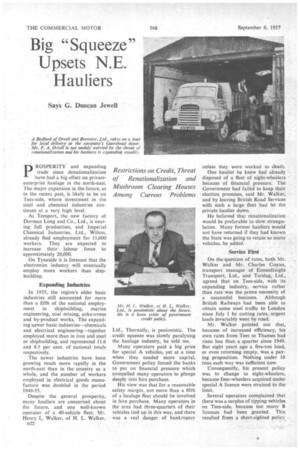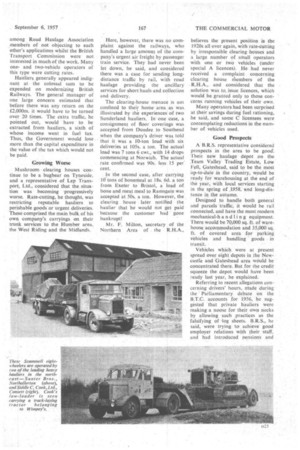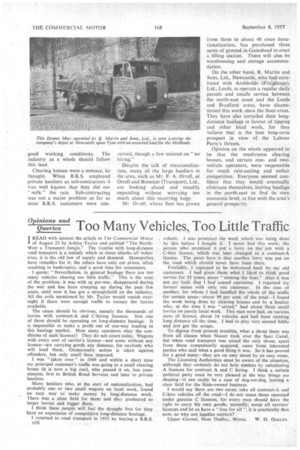Big "Squeeze "
Page 68

Page 71

Page 72

If you've noticed an error in this article please click here to report it so we can fix it.
• Upsets N.E.
Hauliers
Says G. Duncan Jewell
pROSPER1TY and expanding trade since denationalization have had a big effect on privateenterprise haulage in the north-east. The major expansion in the future, as in the recent past, is likely to be on Tees-side, where investment in the steel and chemical industries continues at a very high level.
At Teesport, the new factory of Dorman Long and Co., Ltd., is nearing full production, and Imperial Chemical Industries, Ltd., Wilton, already find employment for 11,000 workers. They are expected to increase their labour force to approximately 20,000.
On Tyneside it is forecast that the electronics industry will eventually employ more workers. than shipbuilding.
Expanding Industries In 1955, the region's older basic industries still accounted for more than a fifth of the national employment in shipbuilding, marine engineering, coal mining, coke-ovens and by-product works. The expanding newer basic industries—chemicals and electrical engineering—together employed more than in iron and steel or shipbuilding, and represented 11.6 and 8.5 per cent. of national totals respectively.
The newer industries have been growing much more rapidly in the north-east than in the country as a whole, and the number of workers employed in electrical goods manufacture was doubled in the period 1949-55.
Despite the general prosperity, many hauliers are concerned about the future, and one well-known operator of a 40-vehicle fleet, Mr. Henry L. Walker, of H. L. Walker,
D22, Ltd., Thornabey, is pessimistic. The credit squeeze was slowly paralysing the haulage industry, he told me.
Many operators paid a big price for special A vehicles, yet at a time when they needed more capital, Government policy forced the banks to put on financial pressure which compelled many operators to plunge deeply into hire purchase.
His view was that for a reasonable safety margin, not more than a fifth of a haulage fleet should be involved in hire purchase. Many operators in the area had three-quarters of their vehicles tied up in this way, and there was a real danger of bankruptcy unless they were worked to death.
One haulier he knew had already disposed of a fleet of eight-wheelers because of financial pressure. The Government had failed to keep their election promises, said Mr. Walker, and by leaving British Road Services with such a large fleet had let the private haulier down.
He believed that renationalization would be preferable to slow strangulation. Many former hauliers would not have returned if they had known the State was going to retain so many vehicles, he added.
Service First
On the question of rates, both Mr: Walker and Mr. Charles Coates; transport manager of Econofreight Transport, Ltd., and Tarslag, Ltd., agreed that on Tees-side, with its expanding industry, service rather than rate was the prime necessity of a successful business. Although British Railways had been able to obtain some steel traffic to London since July 1 by cutting rates, urgent loads invariably went by road.
Mr. Walker pointed out that, because of increased efficiency, his own rates from Tees to Thames had risen less than a quarter since 1949. But eight years ago a five-ton load, or even returning empty, was a paying proposition. Nothing under 10 tons each way was sufficient now.
Consequently, his present policy was to change to eight-wheelers, because four-wheelers acquired under special A licence were strained to the limit.
Several operators complained that there was a surplus of tipping vehicles on Tees-side, because too many B licences had been granted. This resulted from a short-sighted policy
among Road Haulage Association members of not objecting to each other's applications whilst the British Transport Commission were not interested in much of the work. Many oneand two-vehicle operators of this type were cutting rates.
Hauliers generally appeared indignant at the colossal sum to be expended on modernizing British Railways. The general manager of one large concern estimated that before there was any return on the £2,000m. it would have to be turned over 20 times. The extra traffic, he pointed out, would have to be extracted from hauliers, a sixth of whose income went in fuel tax. Thus, the Government would lose. more than the capital expenditure in the value of the tax which would not be paid.
Growing Worse
Mushroom clearing houses continue to be a bugbear on Tyneside. and a representative of Lep Transport, Ltd., considered that the situation was becoming •progressively worse. Rate-cutting, he thought, was restricting reputable hauliers to perishable goods or urgent deliveries. These comprised the main bulkof his own company's carryings on their trunk services to the Humber area, the West Riding and the Midlands. Here, however, there was no complaint against the railways, who handled a large amount of the company's urgent air freight by passenger train service. They had never been let down, he said, and considered there was a case for sending longdistance traffic by rail, with road haulage providing the ancillary services for short hauls and collection and delivery.
The clearing-house menace is not confined to their home area as was illustrated by the experiences of two Sunderland hauliers. In one case, a consignment of floor coverings was accepted from Dundee to Southend when the company's driver was told that it was a 10-ton load with six deliveries at 105s. a ton. The actual load was 7 tons 6 cwt., with 14 drops commencing at Norwich. The actual rate confirmed was 90s. less 15 percent.
In the second case, after carrying 10 tons of bonerneal at 18s. 6d. a ton from Exeter to Bristol, a load of bone and meat meal to Rarnsgate was accepted at 56s. a ton. However, the clearing house later notified the haulier that he would not get paid because the customer had gone bankrupt!
Mr. F. Milton, secretary of the Northern Area of the R.H.A., believes the present position is the 1920s all over again, with rate-cutting by irresponsible clearing houses and a large number of small operators with one or two vehicles (under special A licences). He had never received a complaint concerning clearing house thembers of the R.H.A., and considered that the solution was to. issue licences, which would be granted only to those concerns running vehicles of their own.
Many operators had been surprised at their savings during fuel rationing, he said, and some C licensees were contemplating reductions in the number of vehicles used.
Good Prospects
A B.R.S. representative considered prospects in the area to be good'. .[heirnew haulage depot on the Team Valley Trading Estate, Low Fell, Gateshead, said to be the most up-to-date in the country, would be ready for warehousing at the end of the year, with local services starting in the spring of )958, find long-distance in the autumn.
Designed to handle both general and parcels traffic, it would be rail connected, and have the most modern mechanical-h andling equipment. There would be 70,000 sq. ft. of warehouse accommodation and 35,000 sq. ft. of covered area for parking vehicles and handling goods in transit.
Vehicles which were at present spread over eight depots in the Newcastle and Gateshead area would be concentrated there. But for the credit squeeze the depot would have been ready last year, he explained.
Referring to recent allegations concerning drivers' hours, made during the Parliamentary, debate on the B.T.C. accounts for 1956, he suggested that private hauliers were making a noose for their own necks by allowing such practices as the falsifying of -log sheets. B.R.S., he said, were trying to achieve good employer relations with their staff, and had introduced pensions and
good working conditions. The industry as a whole should follow this lead.
Clearing houses were a menace, he thought. When B.R.S. employed private hauliers as sub-contractors it was well known that they did not 'milk" the rate. Sub-contracting was not a major problem so far as most B.R.S. customers were con
cerned, though a few insisted on "no h i ring." • • Despite the talk of renationalization, many of the large hauliers in the area, such as Mr. F. A. OrrelI, of OrreIl and Brewster (Transport), Ltd., are looking ahead and steadily expanding without worrying too much about this recurring bogy.
Mr. Orrell, whose fleet has grown from three to about 40 since denationalization, has purchased three acres of ground in Gateshead to erect a filling station. There will also be warehousing and storage accommodation.
On the other hand, R. Martin and Sons, Ltd., Newcastle, who had cornbined with Archbolds (Freightage), Ltd., Leeds, to operate a regular daily parcels and smalls service between the north-east coast and the Leeds and Bradford areas, have discontinued this work since the Suez crisis. They have also curtailed their longdistance hadlage in favour of tipping and other local work, for they believe that is the best long-term prospect in view of the Labour Party's threats.
Opinion on the whole appeared to be that the mushroom clearing houses, and certain oneand twovehicle operators, were responsible for much rate-cutting and Unfair competition. Everyone seemed confident that they would eventually eliminate themselves, leaving haulage in the .north-east to find its own economic level, in line with the area's general prosperity.




























































































































